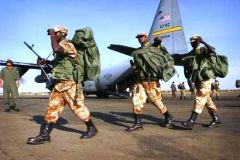UN draft resolution authorizes 26000 troops for Darfur
July 11, 2007 (UNITED NATIONS) — Britain, France and Ghana on Wednesday circulated a revised Security Council draft resolution authorizing a 26,000-strong African Union-U.N. peacekeeping force for Darfur for an initial period of 12 months.and threaten “further measures” against combatants who attack civilians and obstruct peace efforts.
 The draft makes it clear that “there will be unity of command and control,” meaning a single chain of command and that “command and control structures and backstopping will be provided by the United Nations”. A move that would clear up the contentious issue of who will be in charge of the joint A.U.-U.N. force, but may raise Sudan’s opposition to the resolution.
The draft makes it clear that “there will be unity of command and control,” meaning a single chain of command and that “command and control structures and backstopping will be provided by the United Nations”. A move that would clear up the contentious issue of who will be in charge of the joint A.U.-U.N. force, but may raise Sudan’s opposition to the resolution.
U.N. peacekeeping chief Jean-Marie Guehenno indicated last month that the Sudanese government had accepted that the U.N. would have overall operational control of the force, while day-to-day operations would be in the hands of its African commanders. But many council members wanted that spelled out clearly in a resolution.
The text “decides, in order to support the early and effective implementation of the Darfur Peace Agreement (DPA), to establish for an initial period of 12 months” the AU-UN hybrid operation.
It says the proposed force that will be known as UNAMID shall “consist of up to 19,555 military personnel and an appropriate civilian component including up to 3,772 police personnel and 19 formed police units.”
It warns that “in the event the (Sudanese) parties fail to fulfill their commitments or cooperate fully with this resolution … the council will take further measures” which it did not specify.
The text urges UN chief Ban Ki-moon to put in place without delay the practical arrangements to deploy the hybrid force “including submitting to the General Assembly recommendations on funding and effective financial management and oversight mechanisms”.
It stresses that the 7,000 ill-equipped AU troops currently operating in Darfur need “urgent financial, logistical and other support, and call on member states and regional organizations to provide further assistance, in particular to permit the early deployment of two additional battalions during the transition to UNAMID”.
One paragraph of the draft invokes Chapter Seven of the UN Charter to state that UNAMID “is authorized to use all necessary means, in the areas of deployment of its forces … prevent attacks and threats against civilians.”
Chapter Seven is used in cases of threats to international peace and security.
UNAMID, which is not expected to be on the ground before early next year, would also be empowered to use force to protect its personnel, ensure security and freedom of movement for them, as well as for humanitarian workers, and prevent any attempt to disrupt implementation of the DPA.
It demands that all parties in Darfur “immediately cease hostilities and attacks” on the A.U. force, civilians and humanitarian workers. It also emphasizes that “there can be no military solution to the conflict in Darfur and calls upon the government of Sudan and the rebel groups to enter into talks” to reach a political settlement.
The draft resolution calls on all parties to urgently facilitate the full deployment of the heavy support package and an earlier light support package, and to finalize contributions to the hybrid force within 30 days of the adoption of the resolution.
The draft resolution asks Secretary-General Ban Ki-moon to report to the council in three months on progress – and obstacles – to deploying the light and heavy support packages, to implementing a U.N.-Sudan agreement to speed up humanitarian assistance, to promoting a political settlement, to achieving a cease-fire, and to implementing last year’s Darfur Peace Agreement.
It also asks Ban and a panel of experts “to report immediately to the council on any failure by the parties to comply with this resolution.”
The draft stresses that “in the event the parties to the conflict in Darfur fail to fulfill their commitments or cooperate fully with this resolution” or previous resolutions “the council, drawing on the above reports, will take further measures.”
It was unclear when the text would be put to a vote by the 15-member council.
Khartoum signed the DPA with Darfur rebels in Nigeria more than a year ago but only one of three negotiating rebel factions endorsed the deal.
UN and AU mediators are now trying to broaden the accord to include those rebel groups that did not sign it last year.
Sudanese President Omar al-Beshir gave his unconditional approval of the deployment of UNAMID in a June 17 meeting with a UN Security Council delegation in Khartoum.
The Darfur conflict began in 2003 when an ethnic minority rose up against the Arab-dominated government in Khartoum, which then enlisted the Janjaweed militia group to help crush the rebellion.
According to UN estimates, at least 200,000 people have died from the combined effect of war and famine since the conflict started in February 2003. Other sources give a much higher toll, but Khartoum disputes the figures.
(AFP/AP)
